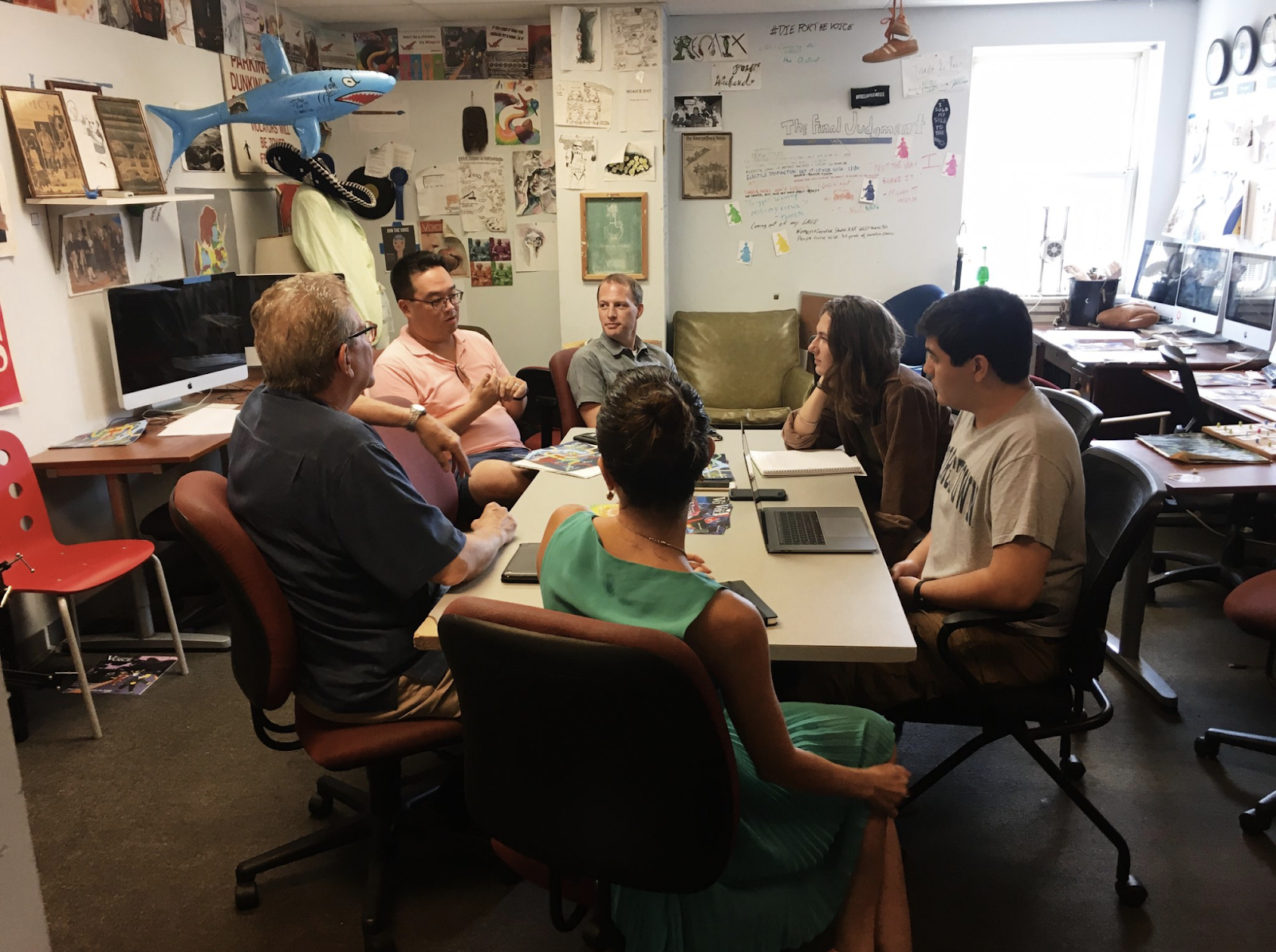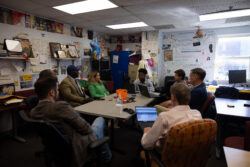The Fall 2018 GU Politics Fellows with the McCourt School of Public Policy sat down with the Voice on Sept. 7 to talk politics, bipartisanship, and concertgoing. The fellows will hold weekly discussion groups and office hours throughout the semester as part of the GU Politics Fellows Program, which was established in 2015.
The fellows, all significant names in government and media, represent a wide range of political viewpoints. The program aims to create bipartisan discussion on campus, as well as boost student engagement with politics.
Tim Lim, the CEO of Lim Consulting Services LLC, a Democratic strategy firm, will focus on digital campaigning and progressive movements in his discussion group, while Ed Goeas, the president and CEO of the Tarrance Group, a Republican strategy firm, will discuss civility and incivility in politics.
The two other fellows that spoke with the Voice are Suzanne Kianpour, a foreign affairs journalist with the BBC, and Josh Pitcock, a lobbyist at Oracle. Erin Conaton, the fifth fellow, was unavailable at the time of the interview. She is the former undersecretary of the Air Force, and will focus her discussions here on national security.
This interview has been edited for clarity and length.
The Voice: What role do you think college students should play in our nation’s politics?
LIM: What makes this generation, this Generation Z, of students who are coming out of college and who are going to be going on to doing bigger and better things, is that they have access to information. And they have toolsets that just weren’t available to previous generations. So this generation, your generation, knows more, has more information, has the ability to organize million-person rallies, has the ability to break news, has the ability to engage with others all across the world, that I didn’t have. And I’m a millennial!
For progressive movements in general, we have to realize that this isn’t like a college situation in 2004 or 2008, that we’re in a different environment. We’re dealing with people that don’t consume information the way that most voters do, older voters do. And if we don’t acknowledge that, and we don’t understand how that happens, then there’s going to be a massive disconnect.
PITCOCK: On college students’ impact, well, in this town, and across the country, college students have a big impact, because you’re the free labor that helps get things done in government offices —
LIM: We’re working on the free part!
PITCOCK: — and you should take advantage of that. Because it is your ability as a college student to go in and do an internship in some hall of government, or a campaign, or a think tank, or some nonprofit, which gives you entry to a whole world that you haven’t seen yet. And they appreciate your fresh perspective. They appreciate you getting coffee as well, but there is more to it. And I think that that students having those experiences… it broadens your education. So that when you have your degree, you have a better sense of what you want to do.
TV: What is the importance of bipartisanship? Can we get better at having those conversations?
KIANPOUR: Well, we were joking that earlier we had a conversation that was very tame. There were a lot of different viewpoints, but it was very tame — and it’s not something you’d see on television, because it was very tame.
LIM: No cable channel wants to hire us.
KIANPOUR: We weren’t cursing, we were speaking with each other, not interrupting. I work in television and that’s not something that I see from our competitors. I’m with the BBC, so we allow our people to speak! But I think this fellowship program, we’ve already seen — and we’re barely 48 hrs into it — is such a unique opportunity to be able to have these discussions.
PITCOCK: I’d say bipartisanship is not dead, and bipartisanship happens every day around the country, and states. State governments, for example, where they have firm requirements for balanced budgets. So state legislatures have to work with the governor, and oftentimes they’re of different parties, and even if they’re not, the minority party has a bigger say. And things get done, necessarily.
In this town, in Washington, bipartisanship seems to be a bad word, especially when you look at it through the lens of the media, or what the talking heads say is happening. But even behind the scenes in Congress, there’s bipartisan activity that gets done. You just don’t ever see or hear about it, because it doesn’t get clicks or eyeballs.
GOEAS: At the end of the day, it’s going to take everyone policing their own side. It’s going to take Republicans standing up against Republicans that crossed the line, Democrats standing up to Democrats, and news media standing up to news media. Otherwise, it’s not going to work. Because we do live in an age that unfortunately very seldom asks anymore, “does the end justify the means?” We don’t start there. We don’t even end there. And that’s unfortunate.
TV: What is one thing you want students to take away from your time here on campus?
KIANPOUR: That we’re not all fake news.
GOEAS: If I walk away with the students feeling like they have an impact on whatever they write in the future, it would be a success.
LIM: I don’t want to sound corny, but what I’m going to say is corny, and my friends will hear this and make fun of me: That’s there is still hope.
PITCOCK: I hope the students leave after one session, or after coming to all eight, with a sense that there are a lot of open doors for them to work in the government, public service, or politics in general, beyond just the default of interning on the Hill.
TV: Outside of politics and your professional lives, what is something we might not know about you?
KIANPOUR: I feel like I have to plug my Beiruti hairdresser, because I only get my hair highlighted by my guy in Beirut. I can’t go anywhere else. I go at least once a year. When I lived in Beirut in 2014 during the rise of ISIS, people had such a preconception about Lebanon. Yes, there were three suicide bombings in one week, but actually Lebanon is a beautiful country. Beirut is an amazing city, and they have the best hairdressers in the world. And when you find the one, you find the one.
GOEAS: I have this bucket list. It’s not how many countries I want to go to, but who I want to see in concert. I go to anywhere from 20 to 24 concerts a year. I’ve seen Bruce Springsteen 48 times through the years. Every year for my birthday I go see Jimmy Buffett. I go to every concert I can get my hands on.
LIM: I’ve got something that people don’t know about me. I’m ashamed of this, so let me preface with that. I love reading Techno thrillers like Tom Clancy and Dale Brown. My reading habits are of like 60 year old white Republican male.
GOEAS: Should I be offended by that?
LIM: No, not at all, I’m just stereotyping. I have a secret group of liberal friends who love techno thrillers and we talk about them. It’s something we don’t talk about publicly because we will get made fun of.
GOEAS: To promote my strategic student team for my sessions, I will say I plan on taking them to a concert.
LIM: Are we doing this? Are we really doing this? Is this a race now? I will take them to a Jay-Z/Beyonce concert.
GOEAS: I’m trying to get tickets for Maroon 5 when they come.
PITCOCK: I’m a pretty open book. My dad and I climbed Mount Kilimanjaro.
LIM: That’s too cool though. You’re just making us look lame now.
KIANPOUR: Since you said that, I’ve been to 52 countries.







